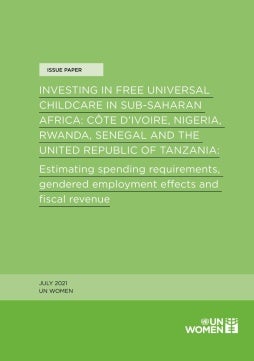Independent evaluation: Transformative approaches to recognize, reduce and redistribute unpaid care work in women’s economic empowerment programming
In Africa, women dedicate 3.5 times more time to unpaid care and domestic responsibilities than men, resulting in limitations to their education, income, and community leadership. To address this disparity, UN Women, with the funding of Global Affairs Canada, implemented “Transformative approaches to recognise, reduce, and redistribute unpaid care work in women’s economic empowerment programming” (3R Programme) in Rwanda, Senegal, and South Africa, from March 2021 to March 2023.
To evaluate the outcomes of the 3R Programme, UN Women commissioned an independent evaluation conducted between December 2022 and April 2023. The purpose was to assess programme results, understand how and why they were achieved or not, and provide guidance on decisions regarding the programme’s continuity, improvement, scaling up, or replication.
This executive summary presents findings and recommendations derived from an integrated analysis of data obtained through stakeholder consultations, field visits, and a desk review of programme documents. The summary addresses the relevance, effectiveness, efficiency, sustainability, and considerations for gender, human rights, and disability inclusion across the three countries. Lessons learned from the evaluation confirm the validity and effectiveness of the adopted strategies.
The document assesses the transformative, innovative, and regionally relevant aspects of the programme, outlining its context-sensitive response to the basic needs of targeted groups, including technologies, employment opportunities, and gender-based violence services.
Concluding with recommendations, the summary highlights the necessary policies, strategies, legal provisions, and action areas required to accelerate progress in women’s economic empowerment by addressing the 3Rs of unpaid care and domestic work.










